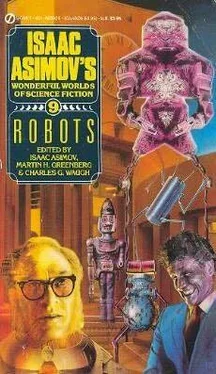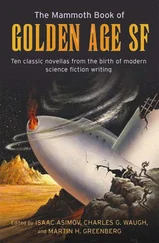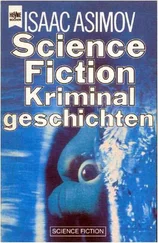Frederik Pohl - Isaac Asimov's Worlds of Science Fiction. Book 9 - Robots
Здесь есть возможность читать онлайн «Frederik Pohl - Isaac Asimov's Worlds of Science Fiction. Book 9 - Robots» весь текст электронной книги совершенно бесплатно (целиком полную версию без сокращений). В некоторых случаях можно слушать аудио, скачать через торрент в формате fb2 и присутствует краткое содержание. Год выпуска: 1989, ISBN: 1989, Издательство: Robinson Publishing, Жанр: Фантастика и фэнтези, на английском языке. Описание произведения, (предисловие) а так же отзывы посетителей доступны на портале библиотеки ЛибКат.
- Название:Isaac Asimov's Worlds of Science Fiction. Book 9: Robots
- Автор:
- Издательство:Robinson Publishing
- Жанр:
- Год:1989
- ISBN:ISBN: 1-85487-041-6
- Рейтинг книги:4 / 5. Голосов: 1
-
Избранное:Добавить в избранное
- Отзывы:
-
Ваша оценка:
- 80
- 1
- 2
- 3
- 4
- 5
Isaac Asimov's Worlds of Science Fiction. Book 9: Robots: краткое содержание, описание и аннотация
Предлагаем к чтению аннотацию, описание, краткое содержание или предисловие (зависит от того, что написал сам автор книги «Isaac Asimov's Worlds of Science Fiction. Book 9: Robots»). Если вы не нашли необходимую информацию о книге — напишите в комментариях, мы постараемся отыскать её.
Isaac Asimov's Worlds of Science Fiction. Book 9: Robots — читать онлайн бесплатно полную книгу (весь текст) целиком
Ниже представлен текст книги, разбитый по страницам. Система сохранения места последней прочитанной страницы, позволяет с удобством читать онлайн бесплатно книгу «Isaac Asimov's Worlds of Science Fiction. Book 9: Robots», без необходимости каждый раз заново искать на чём Вы остановились. Поставьте закладку, и сможете в любой момент перейти на страницу, на которой закончили чтение.
Интервал:
Закладка:
I went into Ila's room a few minutes ago. Her eyes were closed and her breathing was shallow. I spoke to her, but she merely lifted her hand and said nothing. My poor Ila! Why must she face so much misery, while I experience such joy and satisfaction in my work?
Jan. 1, 1998. It has been almost two months since I last touched this journal, but I must take strength in this New Year and continue. It has been hard for me to work at all; there has been too much bitterness in my mind and unhappiness in my heart since Ila's death.
As I write these words, little Fitz is sleeping peacefully in his crib, watched over by his new nursemaid, Annette. But Mac, who needs no sleep, is sitting in the study chair beside my desk, watching me through the expressionless eyes I have placed in his silver skull. Yet, blank as they are, somehow I sense emotion in those eyes as he watches me. Somehow, I feel my robot creation knows the torment I suffer, and knows the void in our home since Ila's death. Does he miss her, too? It is so difficult to tell. Even with Fitz, my human child, it is hard to recognize the signs of sorrow he must be feeling.
During these past weeks, I began to believe that my experiment was all a conceit. But now I realize it was only grief that brought such thoughts; I must continue. Already, I believe Mac thinks of Fitz as his brother, and I know that someday Fitz will reciprocate. There will be much to learn from both of them. I cannot fail my mission now. I will go on.
July 25, 2002. Today, my family and I began life in new surroundings, and as difficult as the transplantation has been, I am glad now that we made the move. It had become too much of a burden to face the curiosity and gibes of the neighborhood; we have attracted too much attention. For this reason, I have purchased this small home in the exurbs of the city, just outside the town of Fremont.
Both my children seem happy in their new country residence. They are playing together now on the green grass that grows untamed behind the house; I will have to trim and weed it, like a truly domesticated homeowner. I think I shall enjoy the sensation.
Despite our problems, my joy is great as I watch the human and mechanical beings outside my window, laughing and romping together as if the differences between them had no existence. In one respect, my experiment is already successful. In the eyes of Fitz, my human boy, and Mac, my inhuman invention, they are truly brothers. Fitz, at the age of five, is a sturdy, red-cheeked boy with dark eyes and a smile that easily becomes a laugh. There is a great deal of warmth in him; he is open and frank with people; and with his metallic brother.
As for Mac, of course, he is the same as ever; the same polished silvery body, encased in the simple tunic I have made to cover his metallic nakedness. They are almost the same height, but Fitz is a bit taller, and growing each day. Before long, it will be time to reconstruct my robot child's body again.
I have presented my first full-length paper on the experiment to the National Robotics Society. I must admit that I eagerly await their acceptance and publication.
Sept. 3, 2003. This morning, I opened my door upon a matronly woman whose pleasantries concealed an icy attitude towards myself and my family. She introduced herself as Mrs. Margotson, chairwoman of the local school board.
It was some time before Mrs. Margotson revealed the true purpose of her visit, which was to expose the board's reluctance to accept the enrollment of Mac, my robot child.
"You understand, of course," she told me, "that there is no question concerning your son. But the idea of this machine entering our school is perfectly absurd."
I had written a lengthy letter which explained my experiment in detail, but it had made little impression upon the authorities. She kept referring to "that metal thing" and "that machine" and her lip curled in disgust. I wasn't too upset by her attitude; I rather expected it.
"I understand," I told her. "To be honest, I did not expect approval, but I felt it my duty to make the application. However, since the board refuses, I shall not enter either child. I will tutor them both at home."
Mrs. Margotson looked shocked. "Are you serious about this experiment, Dr. Keeley?"
"Certainly. They are brothers, you know."
"Really!"
Both Fitz and Mac were delighted with my plans for their education; it seemed that neither one was keen on the idea of entering the local school. I didn't find out exactly why until late that afternoon.
The reason became apparent when Mac and Fitz returned from some mysterious outing. There was a vacancy in Fitz's mouth where a tooth had been recently and forcibly removed. There was a faint bruise on his cheek, and a hole in the knee of his trousers. I was disturbed by this evidence of a brawl, but was even more shocked and surprised to see a large dent in Mac's silvery forehead. I knew he felt no physical pain, but it was startling.
"What happened?" I said.
Fitz, always the spokesman, shrugged his shoulders.
"Just a fight," he said glumly.
"What do you mean, just a fight? Who with? What about?"
"Some-kids. Kids from the school."
"How many kids?"
"Five or six," Fitz said. "They threw things. Rocks."
I was appalled, and now I knew what had caused the dent. I don't know why I should have been surprised at the tale of violence. I had learned before, in our old city neighborhood, that my robot child was a natural target for the cruel taunts and unthinking violence of children.
I treated Fitz's wounds, and then drew Mac aside. "What happened?" I asked gently. "Fitz told you. We had a fight."
"I want to hear your version. Were they making fun of you, Mac? Is that it?"
"Yes."
"How did you feel about it?" I asked the question eagerly; it was important to me to learn the emotional responses of my creation.
Mac didn't answer for a while, his face a silver mask.
"Did you feel hurt, angry? Did you want to strike back?
I've told you this often, Mac-you must never strike a human. They're soft, you know, not hard like you. Did you want to hurt them, Mac?" Instinctively, I reached for pencil and paper to record his reactions.
"Yes," he said.
My heart leaped. My robot child had felt anger!
"But you didn't?"
"No."
"Why, Mac? Because you realized you were strong and they were weak? Because they felt pain and you didn't?"
"No!" He was almost defiant.
"What, then?"
"Because I am little," he whispered.
The reply disturbed me. I hadn't yet gotten around to performing the mechanical surgery that would give Machine his new body. He was several inches shorter than his brother, shorter than most boys his age.
Patiently, I explained to him again the rules of conduct I expected of him, rules that could never be broken. There must be no harm to humans; it was the cardinal rule of our code.
"Do you understand that, Mac? Truly understand it?"
"Yes," he answered, his blank eyes on the floor. I sighed.
"All right, then. I will make you bigger, Mac. I will build a new body."
April 23, 2008. It feels good to be recognized, I must admit it. The award conferred upon me by the National Robotics Society yesterday has meant a great deal to me. It has made a difference in the attitude of my neighbors; they no longer think of me as a half-mad creator of monsters, a new Frankenstein. And the monetary grant, while not enormous, will permit me to expand my laboratory facilities. It has come at an opportune time; I have been blueprinting a greatly improved physical housing for Mac, one which will permit his metal body greater flexibility and digital dexterity. I think, too, that I can create a superior sound system for him now, which will overcome the flat, metallic voice of my robot child.
Читать дальшеИнтервал:
Закладка:
Похожие книги на «Isaac Asimov's Worlds of Science Fiction. Book 9: Robots»
Представляем Вашему вниманию похожие книги на «Isaac Asimov's Worlds of Science Fiction. Book 9: Robots» списком для выбора. Мы отобрали схожую по названию и смыслу литературу в надежде предоставить читателям больше вариантов отыскать новые, интересные, ещё непрочитанные произведения.
Обсуждение, отзывы о книге «Isaac Asimov's Worlds of Science Fiction. Book 9: Robots» и просто собственные мнения читателей. Оставьте ваши комментарии, напишите, что Вы думаете о произведении, его смысле или главных героях. Укажите что конкретно понравилось, а что нет, и почему Вы так считаете.









